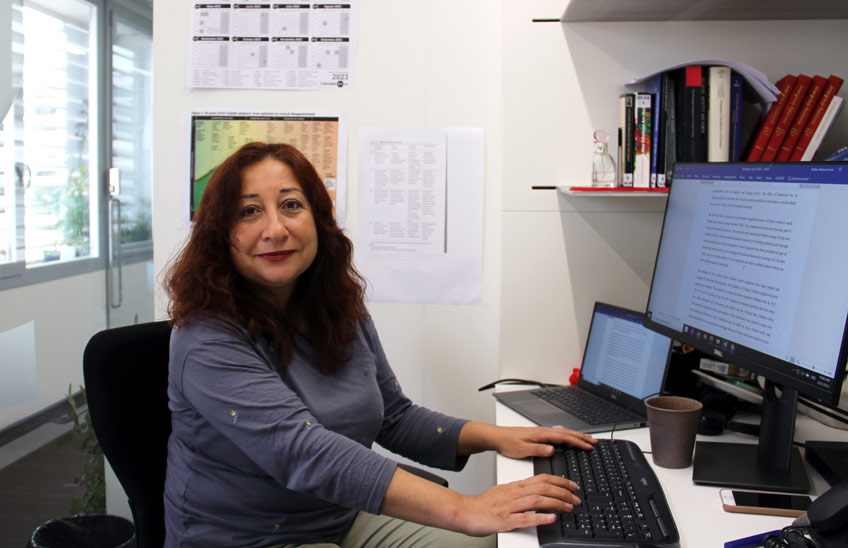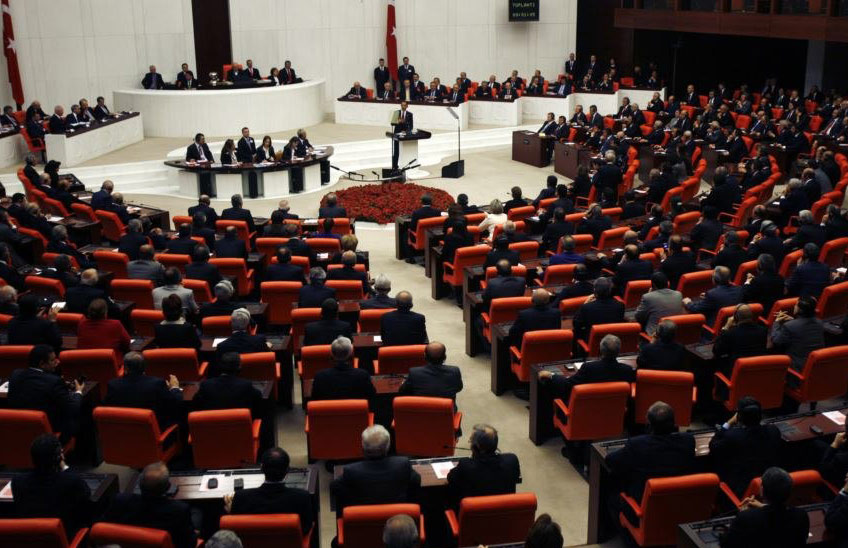"Turkey's populist government foments social polarization through anti-Western speeches."
Melike Akkaraca has completed a research on emotions in Turkey's political speech , developed thanks to a scholarship Marie Curie

PhotoNataliaRouzaut
/Melike Akkaraca has researched Turkey-EU relations.
27 | 04 | 2023
Melike Akkaraca holds a PhD and Master's Degree in European Law from Marmara University (Istanbul, Turkey). In addition, she holds two Master's degrees in International Office and Political Science (Marmara University) and in Legal Theory (European Academy of Legal Theory). In 2021, he joined the group of research 'Public discourse' of the Institute for Culture and Society (ICS) of the University of Navarra thanks to a scholarship Marie Curie, the most competitive call of the European Commission. Her research, which ends in the academic year 2022-2023, has focused on emotions in Turkey's political speech towards the European Union through her project EMOFORTE ('Emotions in Turkey's foreign policy towards the European Union').
What is project about?
The project is about emotions in Turkish foreign policy towards the European Union, what they are and what role they play. The research collects the emotional changes in the political speech diachronically between the years 2002 and 2022, in the light of the surrounding domestic and international developments. In addition, it compares the ideological distribution of each emotion across Europe among the different political parties.
Why are emotions so important in the political speech ?
Expressions of emotions (direct and indirect) play an important role in the articulations, justifications, persuasion, and resonance of political speech . Emotions without a consolidating component of speech influence how we interpret politics and shape our attitudes and reactions to political events and actors.
How are political movements and national identity constructed with emotions?
Shared emotions are as important as shared ideas, values or goals in forming collectives around a common identity. Emotions can mobilize people towards a common end with more force than purely 'rational' motives. Thus, since Aristotle, pathos is an indispensable part of political rhetoric.

"The least emotional speeches about the EU belong to the most positive period in relations."

For its part, the emotional ties related to national identity is what constitutes this identity. Common emotional reactions and feelings sustained over time about specific national issues contribute to the ongoing reconstruction of national identity. Thus, emotional processes related to national identity are an important part of everyday politics.
Does politics today have a more emotional component?
Politics has always been driven by emotions. Just look at Aristotle's writings on rhetoric. Today, however, we see an increase in political polarization, extremism and radicalization. It seems that the antagonistic populist speech instrumentalizes emotions and impacts large groups in society.
The intensification of inequalities - not only between classes but also between countries - the weakening of the rule of law and accelerated neo-liberalization seem to facilitate polarization. Political parties are unable to respond sufficiently and structurally to growing grievances, making the masses vulnerable to emotional manipulation.
What is the role of emotions in the training of Europe's image for political speech in Turkey?
Europe has been at the heart of the conflicting articulations of Turkish identity since the Ottoman Empire. While some groups have seen it as source of hope and admiration, others have seen it as a hostile and unreliable power. Thus, it has been a fertile source of diverse emotions for centuries. The agreement customs union between Turkey and the EU in 1963 and Turkey's candidacy for EU membership in 1999 have rekindled these emotions. Some recent ones, such as resentment, anger and disappointment, have been added after the cessation of Turkey's EU accession negotiations in 2009.
The results of project show that Turkish political speech , whether in parliament or in the public sphere, are almost always emotionally charged. Moreover, the emotional range is not limited to basic emotions, such as fear or anger, but reflects more complex emotions such as resentment, contempt and despair.

Members of parliament during a session at the Turkish Grand National Assembly (2015) (Wikimedia).
What are the main conclusions of project?
An interesting finding is that the least emotional discourses on the EU belong to the period between 2001 and 2005, the most positive period in the relations. During these years, the focus is on the reforms to be carried out for the accession to the EU and there is a political consensus between the parties towards this common goal . On the other hand, the emotional charge increases in the speech from 2006 onwards, especially after 2013.
Another important finding is that, when the hope of EU membership disappears, negative emotions - such as hostility, distrust and anger - towards the Union are increasingly expressed on the political speech , especially by the Justice Party and development (AKP, the party in power since 2002).
Why do negative emotions dominate?
The results of the research suggest that the dominant feelings are anger, disappointment and resentment. This is due to the period analyzed and Turkey's domestic politics. Possibly, the relations between Turkey and the Union in the last 15 years have been the worst since the 1960s. This has been combined with Erdogan's populist government, which encourages the polarization of Turkish society through anti-Western speeches, among other rhetorical devices.
These negative emotions are used in the speech to create chains of equivalence. For example, the provocation of anger or distrust is directed at both Europe and the pro-European elites in Turkish society through ambiguous accusations of malice.

"The populist speech can evoke powerful emotions and create a sense of unity and purpose commonality."

¿And can the populist speech also evoke positive or neutral emotions?
My research has focused on how the West is represented as 'the other' from an antagonistic and polarized speech that generates emotions such as hatred. However, the populist speech also emphasizes the superiority of group, politicizing moral or political differences. This is used to position a group over others, creating a sense of pride, power and even elitism. Moreover, the populistspeech can evoke powerful emotions within a group, such as love, compassion, solidarity, hope or devotion. These emotions unite people and create a feeling of unity and common purpose .
Why are positive relations between Turkey and the Union related to a more rational speech ?
Positive relations depend on transparency and objectivity. For example, Turkey-EU relations experienced their golden years between 1999 and 2006. In this period, the general belief in Turkey was that the relationship with the EU was one of equals. Trust was restored between the two sides as the objective criteria for membership were to be applied to Turkey as well as to other Central and Eastern European countries. In 2006 negotiations came to a halt due to the Cyprus issue. This created an opportunity for anti-Western discourses to resurface on the basis of mistrust and disappointment.
Could you highlight any activity carried out at framework of project?
I would like to highlight the International Symposium 'Emotions and Foreign Policy in Global International Relations: the West and the Rest' held in June 2022. During two days, participants from more than 20 countries and different disciplines presented their research on emotions and speech in various national and local contexts. The speaker keynote speaker was Simon Koschut (Zeppelin University), one of the few experts on the area of emotions at International Office. In addition, the symposium brought together more than 50 people from all over the world virtually.
What are the next steps for your research?
I am working on data, results and presentations on project for articles to be published in scientific journals. During the project, in addition to diachronic and comparative analysis, I have focused on the study of events core topic to have a deeper insight into the semiotics and pragmatics of emotions in political contexts. I have presented these case programs of study at several international congresses in Europe.
In these programs of study I have dealt with topics such as gender, emotions and populist speech ; how emotions can shape environmental discussions in the construction of megaprojects; or on humanitarian foreign policy and how emotions influence nations' status-seeking strategies.
Moreover, the interdisciplinary methodology developed during project -specifically for the discursive analysis of emotions in Turkey- is one tool that can be applied to many other topics. Thus, both the data collected and the methodology developed during the project offer fertile ground for the development of new projects with new questions of research.
I have also applied to several new funds at partnership with researchers from other European countries to continue the research on emotions in a more interdisciplinary and comparative way from a broader network .




